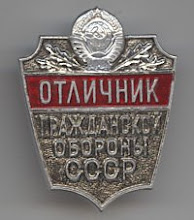В наше время, когда усложняются технологические процессы, когда в производствах применяется всё больше сильнодействующих ядовитых веществ, легковоспламеняющихся жидкостей и радиоактивных веществ, когда увеличивается количество катастроф и стихийных бедствий, значительно возросла социально-экономическая значимость Гражданской обороны.After the Chernobyl accident, Western critics of civil defense argued that the ineptitude of the initial government response proved the worthlessness of the Soviet civil defense system. But it has become increasingly apparent that this was not the lesson drawn from Chernobyl by the current Russian civil defense service, the Ministry of Emergency Situations (MChS). In their view, Chernobyl was not a pathetic failure, but rather evidence of their own heroism and proof that civil defense is worthwhile:
In our time, when technological processes are becoming more complicated, when ever more powerful poisonous, inflammable, and radioactive materials are used in production, when the number of catastrophes and disasters is increasing, the socio-economic significance of Civil Defense has grown significantly.
It'd be interesting to know how many Russians buy into this message; my experience talking to them is too sketchy to get a real feel for what the prevailing sentiment is.В первых рядах ликвидаторов последствий Чернобыльской АЭС были сотрудники Гражданской обороны и среди них наши коллеги: полковник Кравцов В.Е., полковник запаса Семёнов А.Г., и другие.
Уроки Чернобыля и других чрезвычайных ситуаций указали на необходимость проведения целого комплекса мероприятий по приведению гражданской обороны в соответствие с социально — экономическими преобразованиями, проводимыми в стране. Гражданская оборона становится самостоятельным ведомством в структуре исполнительной власти. Государственный комитет по ЧС получает статус Министерства Российской Федерации по делам гражданской обороны, чрезвычайным ситуациям и ликвидации последствий стихийных бедствий.
In the first ranks of the liquidators of the Chenobyl AES were civil defense workers and among those our colleagues: Colonel V.E. Kravtsov, reserve Colonel A.G. Semeinov, and others.
The lessons of Chernobyl and other emergency situations demonstrated the necessity of constructing a complete complex of measures for mobilizing civil defense in accordance with the socio-economic transformations taking place in the country. Civil defense constitutes an independent entity within the the structure of executive power. The State Committee on Emergency Situations holds the status as Ministry of the Russian Federation on Affairs of Civil Defense, Emergency Situations, and the Liquidation of the Consequences of Major Disasters.

5 comments:
I do not think those who are at least familiar with the Chernobyl case will buy this message. In Russia and in the former USSR in general, we do not trust anyone, so they might say whatever but noone cares. We know how unprotected we are, so the only thing we can do is to care for ourselves. On Chernobyl accident - can tell you because I was there myself (Southern Belarus, 1986),- we knew nothing for weeks after the catastrophe, just a few people had headache. And if not the Swedish Forsmark, we probably would not have known anything for months or even years. The defense structures have lost the trust of people then, and they still did not regain it. As for Belarus, it is still like that - whenever there is a gossip that there has been a new accident somewhere, people do not let their children out and buy all the iodium in the drugstores.
By the way, вы говорите по-русски, уважаемый Советолог?
Конечно! Я советолог!
Как узнали люди в БССР вообще о катастрофе в ЧАЭС? Из СМИ западных стран, или советские?
Вообще первым был Горбачов, выступивший кажется в первых числах мая, который официально заявил, что все это произошло, и надо что-то с этим делать. А потом пошло-поехало, хотя сразу мы знали очень мало. К СМИ западных стран мы практически не имели доступа, да и у них не было информации, и не факт, что она была достоверной. А то, что мы узнали потом, через несколько лет, когда уже были отселены 30 километровая зона и много чего вокруг нее, нас только пугало. Людей всегда пугает неизвестность и недосказанность. Именно потому, что мы не знали всей правды, страх живет и до сих пор. Особенно в Беларуси (одна пятая страны заражена радионуклидами).
Post a Comment